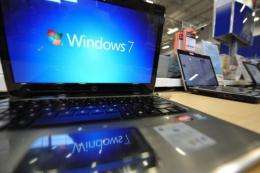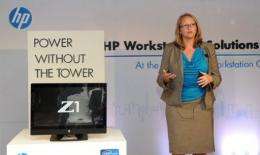As mobile devices advance, PC future murky

The PC is not dead, but it's no longer king of the technology universe.
As Microsoft prepares to launch Windows 8, the newest version of its operating system, the tech landscape is dramatically different from three years ago, when Windows 7 was launched.
The market for mobile devices such as tablets and smartphones is red-hot, leaving the personal computer as an afterthought for many. Microsoft, which was the biggest tech firm in 2009, has fallen behind Apple and Google in market value.
Onetime giants like Hewlett-Packard and Dell are struggling amid sluggish demand as sales of tablet computers and other devices surge.
A report by research firm IDC projected global PC sales this year of 367 million, up just a fraction of a percent from 2011 and marking the second consecutive year of growth below two percent.
ABI Research predicts tablet computers will overtake notebook PCs by 2016 as consumers shift to newer devices like the Apple iPad.
PCs are not heading for the graveyard yet, and will likely get a lift from Windows 8. But the PC appears has taken a back seat to hotter mobile devices.
Rob Enderle, analyst and consultant with Enderle Group, said that talk of the "post-PC era" is premature.
"A lot of us are looking at this as a PC-plus world," he told AFP.
"People are retaining their PCs, but not cycling them as fast. They are supplementing them with tablets. People can't afford to buy both new devices and a lot of people are locked into a cycle on their smartphone."
Roger Kay of Endpoint Technologies Associates said that the PC "still is pretty relevant" but "not the center of the computing universe."
"I think people are going to choose a pantheon of devices, and all of these are connected through the cloud... so the user is now the center of the tech universe."

A Pew Internet study showed in September that 85 percent of American adults have a cell phone, 45 percent have a smartphone and 18 percent have a tablet computer.
Pew found 31 percent of those with Internet-ready phones mostly go online using their cell phone, and not using some other device such as a desktop or laptop computer.
IHS iSuppli said that for the first time since the 1980s, PCs account for less than half the semiconductor chips known as DRAMs. This highlights the illustrates the diminishing domination of PCs in the electronics supply chain.
Clifford Leimbach at IHS said the trend means "PCs are no longer generating the kind of growth and overwhelming market size that can single-handedly drive demand, pricing and technology trends in some of the major technology businesses."
Yet the PC is likely to get a lift with the October 26 release of Windows 8 and a variety of new PCs designed to take advantage of the new system,
Analysts at Gartner say Microsoft is adding some excitement by releasing its own Surface tablet with the new Windows system.
"Windows 8 is not your normal low or even high impact major release of the OS," said Steve Kleynhans, research vice president at Gartner.
"It's the start of a new era for Microsoft."
The new versions of Windows and Internet Explorer set for release have been designed with an emphasis on touch-screen controls to adapt them to new mobile devices.
And Microsoft will have the ability to leverage its productivity tools like Office and Word to keep people in the Microsoft "ecosystem" via cloud computing.
Gartner analysts say that if Windows 8 on tablets is successful, it can regain some traction in the workplace and grab some momentum from Apple and Google-based Android devices.
Kay said Microsoft may be "surprisingly successful" in tablets and other devices because "there are a lot of people who are wary of Apple."
He said Apple "makes corporate buyers less comfortable, it doesn't communicate."
"There is a corporate desire for a good Windows platform in the tablet and the phone area," he said.
E. Werner Reschke of the consultancy Wrinkledog said however Microsoft is becoming less relevant in an era where Google and Apple are taking center stage and that Windows 8 would offer "nothing fantastically new or compelling."
"Their Windows 8-tiled approach may be different, but not necessarily better," he said. "Windows 8 will be Microsoft's version of what you already have—but about four to five years less mature than the rest of the market."
(c) 2012 AFP





















